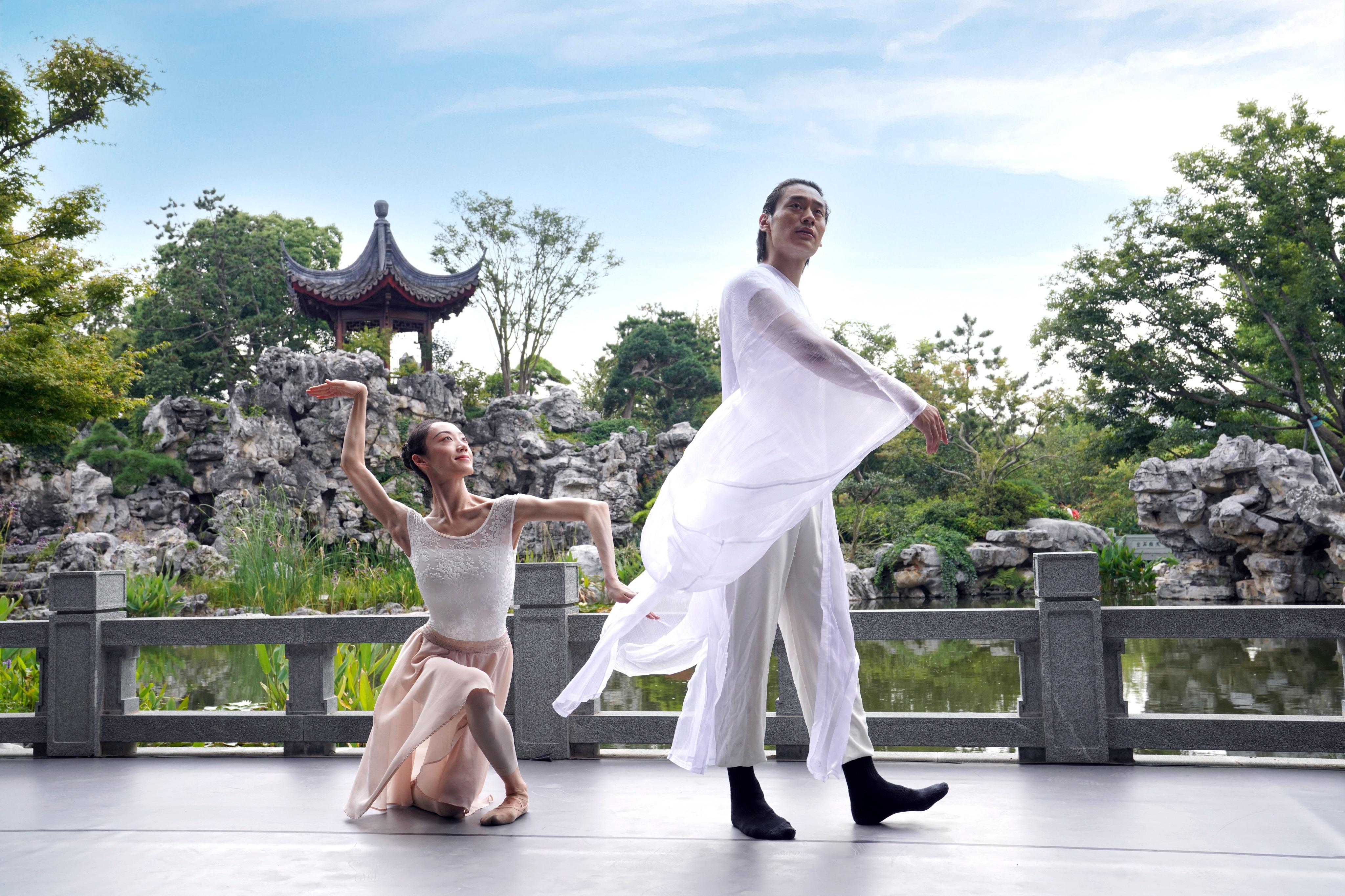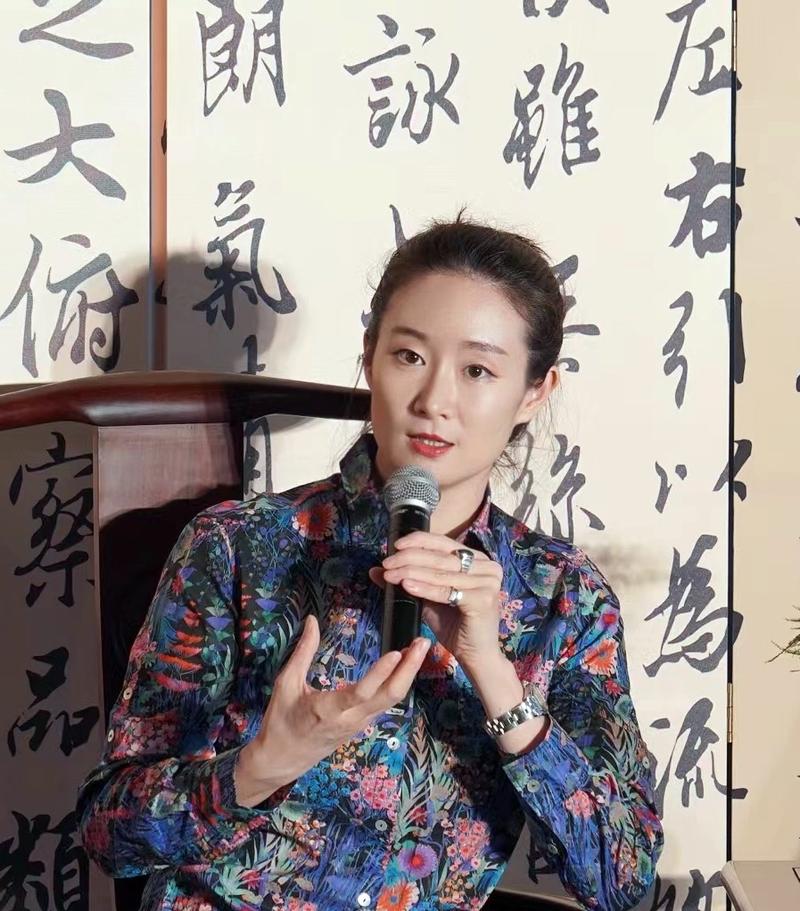 Song Yu (right) and Tan Yimei perform moves from The Ninth Year of Yonghe, which will premiere at the Shanghai Grand Theatre on Nov 10. (PHOTO PROVIDED TO CHINA DAILY)
Song Yu (right) and Tan Yimei perform moves from The Ninth Year of Yonghe, which will premiere at the Shanghai Grand Theatre on Nov 10. (PHOTO PROVIDED TO CHINA DAILY)
The Shanghai Opera House gave a preview on Aug 25 of its upcoming production The Ninth Year of Yonghe, which will premiere at the Shanghai Grand Theatre on Nov 10.
Inspired by one of the most celebrated pieces of calligraphy in Chinese history, Lantingji Xu, or Preface to the Collection of Poems Composed by the Orchid Pavilion, the production has been choreographed and directed by Wang Yabin, and stars Song Yu and Tan Yimei.
We tried to present the mental world of Wang Xizhi, his vision of the world, and how he found uplifting power by placing himself between heaven and earth as part of nature.
Wang Yabin, director of The Ninth Year of Yonghe
Last week the opera house invited members of the media to a tea party at Shen Yuan, a traditional Chinese garden in the Expo Culture Park in the Pudong New Area. Principal company dancers, Song and Tan, performed highlights from the production in the garden, with Song playing the hero and great calligrapher Wang Xizhi (303-361) and Tan playing a goose, Wang Xizhi's favorite bird and which, according to folklore, inspired much of his calligraphy.
"Legend has it that Wang Xizhi kept geese in a pond in his backyard to observe their posture and movement," says Ding Shenyang, chairman of the Shanghai Calligraphers' Association. "It is said that the elegant way they floated on the water inspired him, and he borrowed the graceful curve of their necks to produce some of his strokes."
Wang Xizhi and his son Wang Xianzhi are arguably the most celebrated calligraphers in Chinese history, according to Ding. Their lifetimes coincided with an important transitional period in the development of characters, when the dominant lishu (clerical script) style was gradually replaced by the simpler writing styles of kaishu (regular script), xingshu (semi cursive) and caoshu (cursive script).
Wang Xizhi's xingshu style calligraphy not only reflected the aesthetics of his society, but also set the standard for Chinese calligraphy ever since.
"In his most celebrated composition, Lantingji Xu, viewers experience the rhythm in the flow, as well as the diversity of strokes and characters. The character zhi shows up in the prose 21 times," Ding says, adding that each zhi looks different to the others.
 Wang Yabin, director of The Ninth Year of Yonghe. (PHOTO PROVIDED TO CHINA DAILY)
Wang Yabin, director of The Ninth Year of Yonghe. (PHOTO PROVIDED TO CHINA DAILY)
"Also, the prose of Lantingji Xu is recognized as one of the most beautiful essays in ancient Chinese literature, as it reflects the traditional spiritual pursuit of the Chinese literati, which emphasized harmony between humans and nature."
"The outlook of Chinese calligraphy might have been completely different if Lantingji Xu had never existed. Maybe our aesthetics would be different," he adds.
Calligraphy is very much about the flow of lines on paper, and is sometimes described as "dance with the brush and ink", which is why Ding believes the idea of presenting calligraphy through dance is worthwhile, and says that he is very much looking forward to the premiere of The Ninth Year of Yonghe.
Lantingji Xu consists of 324 Chinese characters arranged in 28 columns, and documents a literary gathering by a creek in today's Shaoxing in Zhejiang province in the year 353, the ninth year of the Yonghe Era. It is said that the attendees placed their wine cups in the water and let them float downstream. When a cup stopped in front of someone, they either had to drink the wine, or compose a poem.
"Creating this production was a most enjoyable journey," says the show's choreographer, Wang Yabin. "We focused on the creative process of this masterpiece of calligraphy."
"We tried to present the mental world of Wang Xizhi, his vision of the world, and how he found uplifting power by placing himself between heaven and earth as part of nature," she adds.
She has been practicing calligraphy herself over the course of the last year, and hopes to convey her experience of calligraphy as well as Wang Xizhi's prose in the thousands of movements that make up the 90-minute production.
If you go
The Ninth Year of Yonghe
7:15 pm, Nov 10-12.
Shanghai Grand Theatre, 300 Renmin Avenue, Huangpu district, Shanghai.
021-6386-8686.


